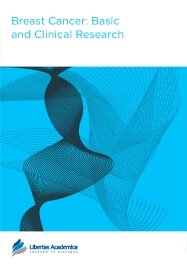

Publication Date: 28 Nov 2011
Type: Review
Journal: Breast Cancer: Basic and Clinical Research
Citation: Breast Cancer: Basic and Clinical Research 2011:5 239-246
doi: 10.4137/BCBCR.S7379

There is an ongoing need for development of new chemotherapeutic regimens for metastatic breast cancer [mBC], especially when tumors lack therapeutic targets such as the estrogen or progesterone receptor [ER/PR], or the human epidermal growth factor receptor-2 [HER2]. Capecitabine is an orally bioavailable fluoropyrimidine approved for monotherapy in mBC, and bevacizumab is a monoclonal antibody targeting vascular endothelial growth factor which has shown to be active in mBC and tolerable in combination with other chemotherapeutics. The combination of these two agents has been explored in multiple phase II and III clinical studies, with improvements in progression-free survival and overall response rates noted as compared to capecitabine monotherapy. However, the use of bevacizumab in combination with capecitabine and other chemotherapy agents for mBC remains beset with controversy due to safety concerns, cost issues, and pending regulatory decisions.
PDF (502.73 KB PDF FORMAT)
RIS citation (ENDNOTE, REFERENCE MANAGER, PROCITE, REFWORKS)
BibTex citation (BIBDESK, LATEX)
XML
PMC HTML

We are delighted about the speedy and professional process.
Facebook Google+ Twitter
Pinterest Tumblr YouTube